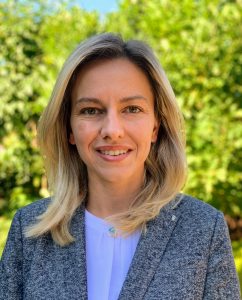Wykłady zagranicznych gości

Zespół ds. Umiędzynarodowienia Instytutu Psychologii zaprasza na spotkanie z prof. Janem Schmutzem, wykładowcą Uniwersytetu w Zurichu, a przy okazji uznanym psychologiem pracy i organizacji specjalizującym się w analizie efektywności i dynamiki zespołów, pracujących w różnych, niejednokrotnie ekstremalnych kontekstach.
O osiągnięciach naukowych gościa można poczytać więcej np. na Research Gate: https://www.researchgate.net/profile/Jan-Schmutz/research
Temat spotkania: TEAMS ON THE EDGE: Lessons from Teams in Extreme Environments
Kiedy: czwartek, 27.03, 15:30-16:30
Gdzie: otwarte spotkanie na MsTeams
Spotkanie odbędzie się w języku angielskim.
24 maja 2022 prof. Sarah Fischer Nowaczyk wygłosi wykład: “Negative Urgency: Personality Influences on Dysregulated Behavior” dla pracowników i studentów Wydziału Nauk Społecznych.
Wykład odbędzie 24 maja br. o godz. 17.00.
Link do spotkania:
Prof. Sarah Fischer Nowaczyk jest licencjonowanym psychologiem klinicznym, pracownikiem zakładu psychologii klinicznej na George Mason University (USA). Terapeutka i superwizor w nurcie terapii dialektyczno-behawioralna. Jej zainteresowania naukowo-badawcze koncentrują się wokół impulsywności w zaburzeniach odżywiania i zażywaniu środków psychoaktywnych oraz utracie kontroli w odniesieniu do czynników kontekstowych.
Szczegółowe informacje nt. prof. Fischer Nowaczyk:
https://psychology.gmu.edu/people/snowaczy
W ramach współpracy z Instytutem Psychologii, Prof. Fischer Nowaczyk prowadzi w semestrze letnim roku akadem. 2021/2022 zajęcia pt. „Terapia Dialektyczno-Behawioralna” dla studentów studiów stacjonarnych Wydziału Nauk Społecznych, w ramach projektu „Zintegrowany Program Rozwoju Uniwersytetu Śląskiego w Katowicach”.
21 grudnia 2021 prof. Emily Sandoz wygłosi wykład: “Nurturing Roots to Reach New Heights: Foundations of ACT as Clinical Behavior Analysis for Mastering Flexible, Process-Based Implementation” dla pracowników i studentów Wydziału Nauk Społecznych.
Wykład odbędzie 21 grudnia br. o godz. 17.00.
Dr. Emily K. Sandoz is the Emma Louise LeBlanc Burguieres/BORSF Endowed Professor of Social Sciences in the Psychology Department at the University of Louisiana at Lafayette. Emily is the Director of the Louisiana Contextual Science Research Group and an Associate Editor of the Journal of Contextual Behavioral Science. She has co-authored three books on acceptance and commitment therapy for struggles with eating and body image, along with chapters and journal articles on ACT, Relational Frame Theory, values, the therapeutic relationship, and psychological flexibility. Emily has led more than 100 training workshops for professionals around the world, and serves as a peer-reviewed ACT trainer. She also practices as a Clinical Psychologist, focusing on clinical behavior analysis.
Abstract: Acceptance and Commitment Therapy (ACT) is defined by its behavior analytic roots and its focus on building flexibility into the behavioral repertoire. Many ACT clinicians, however, find behavior analytic language lacking in its ability to capture and inform the clinical work they do every day. Instead, ACT assessments and interventions are typically guided by less specific, “mid-level terms,” such as acceptance, defusion, and values. While mid-level terms certainly reduce the barriers to learning ACT as a new approach, they may unnecessarily limit the clinicians’ application of ACT to the creation and use of techniques, exercises, and metaphors that target flexibility components. This presentation will offer an alternative approach to ACT mastery – ACT as clinical behavior analysis.
ACT as clinical behavior analysis is simply the direct clinical application of functional contextual behavioral science and behavior analytic theory, typically in a talk therapy format. Many have dismissed behavior analysis as cold, rigid, and overly technical. However, practicing ACT as clinical behavior analysis tends to bring clinicians closer to practicing in a way that is connected, compassionate, and closely attuned to the therapist-client interaction. Far from building in rigidity, practicing ACT as clinical behavior analysis fosters innovation and therapist growth. This presentation will present the model, and orient the audience to next steps for practicing its application
23 listopad 2021 roku o godzinie 11.30, MSc Veronika Lubert wygłosi wykład: „Psychological Interventions for Performance Anxiety Management in Music, Dance, and Acting” dla pracowników i studentów Uniwersytetu Śląskiego.
Spotkanie odbędzie się na platformie Teams: LINK
Veronika Lubert is a doctoral researcher and uni:docs fellow at the Institute of Occupational, Economic, and Social Psychology at the University of Vienna, Austria. In her research, she investigates psychological interventions to enhance performance under pressure in the performing arts. Aiming to transfer the knowledge from sport psychology into the fields of music, dance, and acting, she focuses on interventions that have previously been shown to be beneficial for athletes. Specifically, she is interested in methods to prevent choking under pressure, such as pre-performance routines or goal-setting, and their underlying mechanisms in regard to attentional focus, performance anxiety, and self-efficacy. Holding degrees in both psychology and violin performance, she also works as a performance coach and performs as a violinist with different orchestras in Vienna
Abstrakt wystąpienia:
Psychological Interventions for Performance Anxiety Management in Music, Dance, and Acting Veronika
Lubert1 and Peter Gröpel2
1 Department of Occupational, Economic, and Social Psychology, Faculty of Psychology, University of Vienna
2 Department of Sport Science, Center for Sport Science and University Sports, University of Vienna
Musicians, dancers, and actors often face extraordinary expectations of flawless technique and superior artistic expressiveness, which can result in performance anxiety that can also be detrimental for performance. Recent intervention research in the performing arts has mostly been directed towards the prevention of anxiety, but ad-hoc interventions from sport psychology also offer strategies to manage heightened anxiety in a given moment, for example before an audition. In my experimental research together with sport psychologist Peter Gröpel, we investigated sport-psychological interventions designed to facilitate optimal attentional control for performing under pressure: a pre-performance routine (PPR), the left-hand dynamic handgrip as a specific PPR element, and goal-setting. Having applied these interventions for several weeks, artists with high trait performance anxiety reported increased self-efficacy regarding their ability to perform compared to those with low performance anxiety. In our recent mixed-methods study, ten selected artists received tailored interventions for performance under pressure. After a 12-week intervention period, they exhibited lower physiological arousal during performance and reported less performance anxiety, as well as higher self-efficacy and the belief that having strategies on hand to manage their anxiety will help them in their future artistic career. Our findings indicate that performing arts education can benefit from including psychological instruction and the transfer and adaptation of methods from sport psychology into other performance areas seems promising.

15 czerwca 2021 prof. Monika Stojek wygłosi wykład: “Ścieżki do Rozregulowanego Odżywiania: Oddziaływanie czynników o podłożu motywacyjnym i emocjonalnym” (Pathways to Dysregulated Eating: Examining motivational and emotional factors) dla pracowników Wydziału Nauk Społecznych.
Wykład odbędzie 15 czerwca br. o godz. 11.30 (wykład zostanie wygłoszony w języku polskim)
Link do spotkania: Link
Profesor Monika Stojek jest psychologiem klinicznym z licencją wykonywania zawodu psychologa w Stanach Zjednoczonych. Prof Stojek otrzymała doktorat z University of Georgia i ukończyła rezydenturę kliniczną w Medical College of Georgia. Prof Stojek ukończyła specjalizację badawczo-kliniczną (postdoctoral fellowship) z zakresu psychologii zdrowia w Narodowych Instytutach Zdrowia oraz Uniformed Services University w Waszyngtonie. Przez ostatnie cztery lata, prof Stojek była profesorem klinicznym na wydziale psychiatrii na Emory University School of Medicine, gdzie kontynuuje pracę jako adjunct professor.
Praca badawcza prof Stojek została ukształtowana przez jej doświadczenia kliniczne w zakresie zaburzeń odżywiania, uzależnień i stresu pourazowego. Obecnie, prof Stojek zajmuje się badaniem oddziaływania traumy i symptomów PTSD na zachowania żywieniowe i zdrowie fizyczne. Podczas wykładu, prof Stojek omówi swoje dotychczasowe nurty badawcze oraz teraźniejsze plany badawczo-kliniczne w Polsce i Stanach Zjednoczonych.
——-
Prof. Stojek is a clinical psychologist with an active license in the United States. Dr. Stojek received her PhD from the University of Georgia and completed her clinical residency at the Medical College of Georgia. Dr. Stojek completed her postdoctoral fellowship in clinical health psychology at the National Institutes of Health and Uniformed Services University in Washington, DC. For the past four years, Dr. Stojek was an assistant professor at the Psychiatry Department in the Emory University School of Medicine, where she currently holds a position of adjunct professor.
Dr. Stojek’s research interests were shaped by her clinical work in the fields of eating disorders, addictions, and posttraumatic stress disorder. Currently, she studies relationships between trauma/PTSD symptoms, eating behaviors and physical health. In her talk, Dr. Stojek will discuss her main research questions to date and present her future plans in clinical research in Poland and in the US.

W ramach współpracy zagraniczne Instytutu Psychologii UŚ 13 kwietnia 2021 roku gościnny wykład wygłosiła dr Henderika de Vries. Prelekcja zatytułowana „Cultural Actuation Model of Creativity” dostępna jest na kanale YouTube Uniwersytetu Śląskiego: https://youtu.be/AcJmzTm7yjI
Więcej informacji nt. wykładu oraz prelegentki można znaleźć na stronie: https://us.edu.pl/instytut/ip/2021/03/10/wyklad-dr-henderiki-de-vries/
Dr Henderika de Vries zdobyła tytuł doktora na Uniwersytecie Sorbonne Paris Cité we Francji. Jest stypendystką Fulbrighta, a ostatnio odbyła studia podoktoranckie na Uniwersytecie Yale. Posiada podwójne obywatelstwo, luksemburskie i holenderskie stąd biegle włada 5 językami. Zainspirowana różnicami kulturowymi, pracowała jako asystentka naukowa światowej sławy eksperta w tej dziedzinie, prof. Geerta Hofstede. Zanim była wykładowcą na Sorbonie i Université Paris-Descartes, zajmowała kilka międzynarodowych stanowisk kierowniczych, na przykład w Temenos, światowym liderze w branży oprogramowania bankowego. Później pracowała w obszarze psychologii edukacji w the European Schools Institutions, gdzie inicjowała i zarządzała projektami dotyczącymi dobrostanu i przeciwdziałania znęcania się dla ponad 25 000 uczniów. Jest także absolwentką International Space University (SSP19), a obecnie jej główne badania naukowe dotyczą kreatywności kosmonautów i astronautów w ekstremalnych warunkach środowiskowych. Jest specjalistką w zakresie kulturowych różnic w twórczości (naukowej) oraz tolerancji dla niejasności i niepewności. Obecnie zarządza projektem badawczym ‘Creative Performance podczas Space Analogue Mission‘. Publikacje dr de Vries obejmują współautorstwo rozdziału w ‘Cambridge Handbook of Creativity ‘ (Eds. Kaufman, J., C., & Sternberg, R., 2019), jest również gościnnym redaktorem the Frontiers Topic: ‘Creative Performance in Extreme Human Environments: Astronauts and Space.’
Abstrakt wystąpienia:
Podczas wykładu przedstawiona zostanie relacja między kulturą a twórczością. Istnieją znane różnice kulturowe w kreatywności. Kultura z jednej strony sprzyja twórczej ekspresji, ale może również ją hamować. Ze względu na normy kulturowe dzieci rozwijają różne typy kreatywności. W tym sensie kultura „pobudza” kreatywność. Opierając się na odkryciach międzykulturowych, proponuję „Kulturowy model aktywizacji kreatywności”, reprezentację środowisk kulturowych, które w mniejszym lub większym stopniu sprzyjają określonym rodzajom twórczego poznania. Przykładami wartości kulturowych związanych z kreatywnością są tolerancja wieloznaczności-niepewności i dystans władzy. Model ma implikacje dla wspierania kreatywności w środowiskach edukacyjnych, oceny poziomu kreatywności i dla porównań międzykulturowych.

12 stycznia 2021 roku o godzinie 11.30, prof. Peter Jonason wygłosi wykład: “Darkness around the world” dla pracowników i studentów Wydziału Nauk Społecznych.
Spotkanie odbędzie się na platformie Teams: link do spotkania.
Peter Jonason jest profesorem na Wydziale Psychologii Ogólnej Uniwersytetu w Padwie. W roku akademickim 2020/21 (semestr zimowy) prowadzi zajęcia z psychologii osobowości na kierunku Psychologia, jako profesor wizytujący w Instytucie Psychologii UŚ. Więcej informacji na jego temat można znaleźć na www.peterjonason.com
Abstrakt wystąpienia:
The Dark Triad traits (i.e., narcissism, psychopathy, Machiavellianism) capture individual differences in darker aspects of personality. However, most studies on the Dark Triad traits tend to rely on samples from English-speaking/Western countries and fail to account for country-level variance. In Study 1, we drew on data from 49 countries (N = 11,723) to examine how (a wide net of) country-level variables in economic status (e.g., GDP per capita), social relations (e.g., gender equality), political orientations (e.g., militarization), and social values (e.g., power distance) relate to country-level rates of the Dark Triad traits and variance in the magnitude of sex differences in the Dark Triad traits. Harsher economic conditions were associated with more narcissism and psychopathy whereas more “liberal” social conditions and values were associated with larger sex differences in the narcissism and psychopathy. In Study 2, we collected data from two countries (N = 557) that differ in socioecological conditions (i.e., Turkey and Australia) and measured (1) perceptions of a dangerous and competitive world and (2) individual differences in the Dark Triad traits. Turkish participants were higher in Dark Triad traits than Australian participants were and this was a function of competitive worldviews and stronger in men. Results are discussed using a life history model of personality traits as behavioral syndromes of adaptive social strategies.

Wykład prof. Connie Wanberg z Uniwersytetu w Minnesocie, USA w ramach współpracy zagranicznej Instytutu Psychologii UŚ.
17 listopada 2020 prof. Connie Wanberg wygłosi wykład: “Individuals without Jobs: Job Search, Reemployment, and Implications for Mental Health” dla pracowników Wydziału Nauk Społecznych.
Wykład odbędzie 17 listopada br. o godz. 16.00.
Connie R. Wanberg uzyskała stopień doktora w dziedzinie psychologii przemysłowej/organizacyjnej na Iowa State University. Obecnie jest profesorem i kierownikiem Katedry w Carlson School of Management na Uniwersytecie w Minnesocie.
Prof. Wanberg specjalizuje się w zagadnieniach związanych z zarządzaniem talentami i jest znana na całym świecie ze swojej pracy w obszarach poszukiwania pracy i bezrobocia.
Jej inwentarz „Przygotowanie do następnej pracy” został wykorzystany i zmodyfikowany w kraju i za granicą, aby pomóc osobom bezrobotnym, m.in. w stanie Minnesota oraz przez Holenderską Agencję Ubezpieczeń Pracowniczych.
Jest autorką publikacji w czasopismach naukowych i rozdziałów w książkach, jest członkiem Amerykańskiego Towarzystwa Psychologicznego oraz Towarzystwa Psychologii Przemysłowej i Organizacji.




